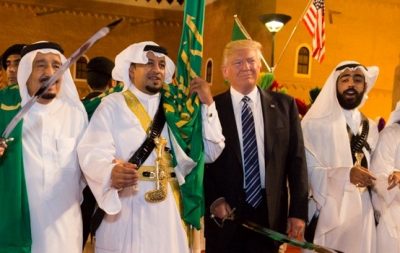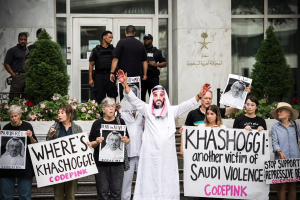Donald Trump: The Frenemy of the Islamic World

In the Republican primaries of the 2016 US presidential elections, Mitt Romney severely castigated Trump, calling him a phony and a fraud. When Trump was elected president, he dangled the carrot of the secretary of state appointment to Romney, invited him to a dinner in an upscale New York restaurant, made him eat his words and fawn all over Trump like a servile toady. But later, he gave the second most coveted appointment in the US bureaucratic hierarchy to oil executive Rex Tillerson.
Romney felt humiliated to the extent that in Trump’s vulnerable moment, when impeachment proceedings were initiated against him in the Senate in February, Romney became the only US senator in the American political history who voted against his own Republican Party president.
Trump is a typical Shylock of the Wall Street belonging to the American libertarian movement. Though his alt-right agenda has been scuttled by the deep state, his views regarding global politics and economics are markedly different from the establishment Democrats and Republicans pursuing neocolonial world order masqueraded as globalization and free trade.
Besides the admission that Trump knew coronavirus was deadly yet he deliberately downplayed the outbreak, Bob Woodward has made several other startling revelations [1] in his book “Rage” set to be released on September 15.
President Donald Trump boasted that he protected Saudi Arabia’s Crown Prince Mohammed bin Salman from congressional scrutiny after the brutal assassination of Saudi dissident and Washington Post journalist Jamal Khashoggi, who was brutally murdered at the Saudi consulate in Istanbul in October 2018.
“I saved his ass,” Trump said in 2018, according to the book. “I was able to get Congress to leave him alone. I was able to get them to stop.”
When Woodward pressed Trump if he believed the Saudi crown prince ordered the assassination himself, Trump responded:
“He says very strongly that he didn’t do it. Bob, they spent $400 billion over a fairly short period of time,” Trump said.
“And you know, they’re in the Middle East. You know, they’re big. Because of their religious monuments, you know, they have the real power. They have the oil, but they also have the great monuments for religion. You know that, right? For that religion,” the president noted. “They wouldn’t last a week if we’re not there, and they know it,” he added.
Despite the crass insensitivity, one must give credit to Trump for his fairly accurate interpretation of the Middle East’s politics and pragmatic relations of the business world. $400 billion he alluded to was likely the unprecedented arms package he availed for the US defense production industry during his maiden overseas visit to Saudi Arabia in May 2017.
By virtue of their physical possession of the holy places of Islam – Mecca and Medina – the Saudi kings are the de facto caliphs of Muslims. The title of the Saudi king: “Khadim-ul-Haramain-al-Shareefain” (the servant of the house of God), makes him the vicegerent of God on Earth; and the title of the caliph of Muslims is not limited to a single nation state, the Saudi king wields enormous influence throughout the commonwealth of Islam, the Muslim Ummah.
The Shia Muslims have their Imams and Ayatollahs (religious authorities), but it is generally assumed about Sunni Islam that it discourages the authority of clergy. In this sense, Sunni Islam is closer to Protestantism, at least theoretically, because it prefers an individual and personalized interpretation of scriptures and religion. Although this perception might be true for educated Sunni Muslims, on the popular level of the masses of developing Islamic countries, the House of Saud plays the same role in Sunni Islam that the pope plays in Catholicism.
Left to their own resources, the Persian Gulf’s petro-monarchies lack the manpower, the military technology and the moral authority to rule over forcefully suppressed and disenfranchised Arab masses, not only the Arab masses but also the South Asian and North African immigrants of the Gulf states. One-third of the Saudi Arabian population is composed of immigrants. Similarly, more than 75% of UAE’s population is also comprised of expats from Pakistan, Bangladesh, India and Sri Lanka.
The rest of the Gulf States, including Kuwait, Qatar, Bahrain and Oman, also have a similar proportion of immigrant workers from the developing countries. Unlike the immigrants of the Western countries, however, who hold the citizenship status, the Gulf’s immigrants have lived there for decades and sometimes for generations, and they are still regarded as unentitled foreigners.
Seemingly, the Western powers support the Gulf’s autocrats because it has been a firm policy principle of the Western powers to promote “political stability” in the energy-rich Middle East instead of representative democracy. They are mindful of the ground reality that the mainstream Muslim sentiment is firmly against Western military presence and intervention in the Middle East region.
In addition, the Western policymakers also prefer to deal with small cliques of Middle Eastern strongmen rather than cultivating a complex and uncertain relationship on a popular level of the masses of the Middle East, certainly a myopic approach which is the hallmark of so-called pragmatic politicians and statesmen.
In this reciprocal relationship, the US provides security to the ruling families of the Gulf Arab States by providing weapons and troops; and in return, the Gulf’s petro-sheikhs contribute substantial investments to the tune of hundreds of billions of dollars to the Western economies in the time of global recession when most manufacturing has outsourced to China.
All the recent wars and conflicts aside, the unholy alliance between the Western powers and the Wahhabi-Salafis of the Gulf petro-monarchies is much older. The British stirred up uprising in Arabia by instigating the Sharifs of Mecca to rebel against the Ottoman rule during the First World War.
After the Ottoman Empire collapsed, the British Empire backed King Abdul Aziz (Ibn-e-Saud) in his struggle against the Sharif of Mecca Hussein bin Ali because he was demanding too much of a price for his loyalty, the unification of the whole of Arabia, including the Arabian peninsula, Levant, Iraq and the Gulf Emirates, under his suzerainty as a price for rebelling against the Ottoman Empire in the First World War.
As a consequence, Western powers dumped him, imposed Sykes-Picot Agreement dividing Arabs into small states at loggerheads with each other, and lent their support to nomadic Sauds of Najd. King Abdul Aziz defeated the Sharifs and united his dominions into the Kingdom of Saudi Arabia in 1932 with the support of the British. However, by then the tide of British Imperialism was subsiding and the Americans inherited the former possessions and the rights and liabilities of the British Empire.
At the end of the Second World War on 14 February 1945, President Franklin D. Roosevelt held a historic meeting with King Abdul Aziz at Great Bitter Lake in the Suez Canal onboard USS Quincy, and laid the foundations of an enduring alliance which persists to this day. During the course of that momentous Great Bitter Lake meeting, among other things, it was decided to set up the United States Military Training Mission (USMTM) to Saudi Arabia to “train, advise and assist” the Saudi Arabian Armed Forces.
Aside from USMTM, the US-based Vinnell Corporation, which is a private military company based in the US and a subsidiary of the Northrop Grumman, used over a thousand Vietnam War veterans to train and equip 125,000 strong Saudi Arabian National Guards (SANG) which is not under the authority of the Saudi Ministry of Defense and acts as the Praetorian Guards of the House of Saud.
In addition, the Critical Infrastructure Protection Force, whose strength is numbered in tens of thousands, is also being trained and equipped by the US to guard the critical Saudi oil infrastructure along its eastern Persian Gulf coast where 90% of 266 billion barrels Saudi oil reserves are located.
Furthermore, the US has deployed tens of thousands of American troops in aircraft carriers and numerous military bases in the Persian Gulf that include al-Dhafra airbase in Abu Dhabi, al-Udeid airbase in Qatar and a naval base in Bahrain where the Fifth Fleet of the US Navy is based.
*
Note to readers: please click the share buttons above or below. Forward this article to your email lists. Crosspost on your blog site, internet forums. etc.
Nauman Sadiq is an Islamabad-based attorney, columnist and geopolitical analyst focused on the politics of Af-Pak and Middle East regions, neocolonialism and petro-imperialism. He is a frequent contributor to Global Research.
Note
[1] Trump boasted that he protected Saudi Crown Prince:
https://www.businessinsider.com/trump-woodward-i-saved-his-ass-mbs-khashoggi-rage-2020-9
Featured image: President Donald Trump poses for photos with ceremonial swordsmen on his arrival to Murabba Palace, as the guest of King Salman bin Abdulaziz Al Saud of Saudi Arabia, Saturday evening, May 20, 2017, in Riyadh, Saudi Arabia. (Official White House Photo by Shealah Craighead)


